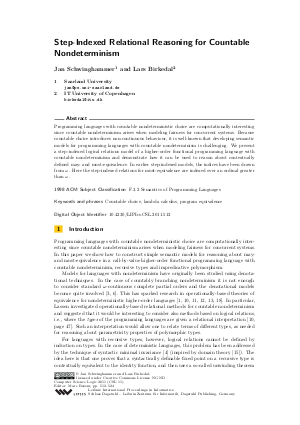Step-Indexed Relational Reasoning for Countable Nondeterminism
Authors Jan Schwinghammer, Lars Birkedal
-
Part of:
Volume:
Computer Science Logic (CSL'11) - 25th International Workshop/20th Annual Conference of the EACSL (CSL 2011)
Part of: Series: Leibniz International Proceedings in Informatics (LIPIcs)
Part of: Conference: Computer Science Logic (CSL) - License:
 Creative Commons Attribution-NonCommercial-NoDerivs 3.0 Unported license
Creative Commons Attribution-NonCommercial-NoDerivs 3.0 Unported license
- Publication Date: 2011-08-31
File

PDF
LIPIcs.CSL.2011.512.pdf
- Filesize: 0.54 MB
- 13 pages
Document Identifiers
Subject Classification
Keywords
- countable choice
- lambda calculus
- program equivalence
Metrics
- Access Statistics
-
Total Accesses (updated on a weekly basis)
0PDF Downloads0Metadata Views
Abstract
Programming languages with countable nondeterministic choice are computationally interesting since countable nondeterminism arises when modeling fairness for concurrent systems. Because countable choice introduces non-continuous behaviour, it is well-known that developing semantic models for programming languages with countable nondeterminism is challenging. We present a step-indexed logical relations model of a higher-order functional programming language with countable nondeterminism and demonstrate how it can be used to reason about contextually defined may- and must-equivalence. In earlier step-indexed models, the indices have been drawn from omega. Here the step-indexed relations for must-equivalence are indexed over an ordinal greater than omega.
Cite As Get BibTex
Jan Schwinghammer and Lars Birkedal. Step-Indexed Relational Reasoning for Countable Nondeterminism. In Computer Science Logic (CSL'11) - 25th International Workshop/20th Annual Conference of the EACSL. Leibniz International Proceedings in Informatics (LIPIcs), Volume 12, pp. 512-524, Schloss Dagstuhl – Leibniz-Zentrum für Informatik (2011)
https://doi.org/10.4230/LIPIcs.CSL.2011.512
BibTex
@InProceedings{schwinghammer_et_al:LIPIcs.CSL.2011.512,
author = {Schwinghammer, Jan and Birkedal, Lars},
title = {{Step-Indexed Relational Reasoning for Countable Nondeterminism}},
booktitle = {Computer Science Logic (CSL'11) - 25th International Workshop/20th Annual Conference of the EACSL},
pages = {512--524},
series = {Leibniz International Proceedings in Informatics (LIPIcs)},
ISBN = {978-3-939897-32-3},
ISSN = {1868-8969},
year = {2011},
volume = {12},
editor = {Bezem, Marc},
publisher = {Schloss Dagstuhl -- Leibniz-Zentrum f{\"u}r Informatik},
address = {Dagstuhl, Germany},
URL = {https://drops.dagstuhl.de/entities/document/10.4230/LIPIcs.CSL.2011.512},
URN = {urn:nbn:de:0030-drops-32535},
doi = {10.4230/LIPIcs.CSL.2011.512},
annote = {Keywords: countable choice, lambda calculus, program equivalence}
}
